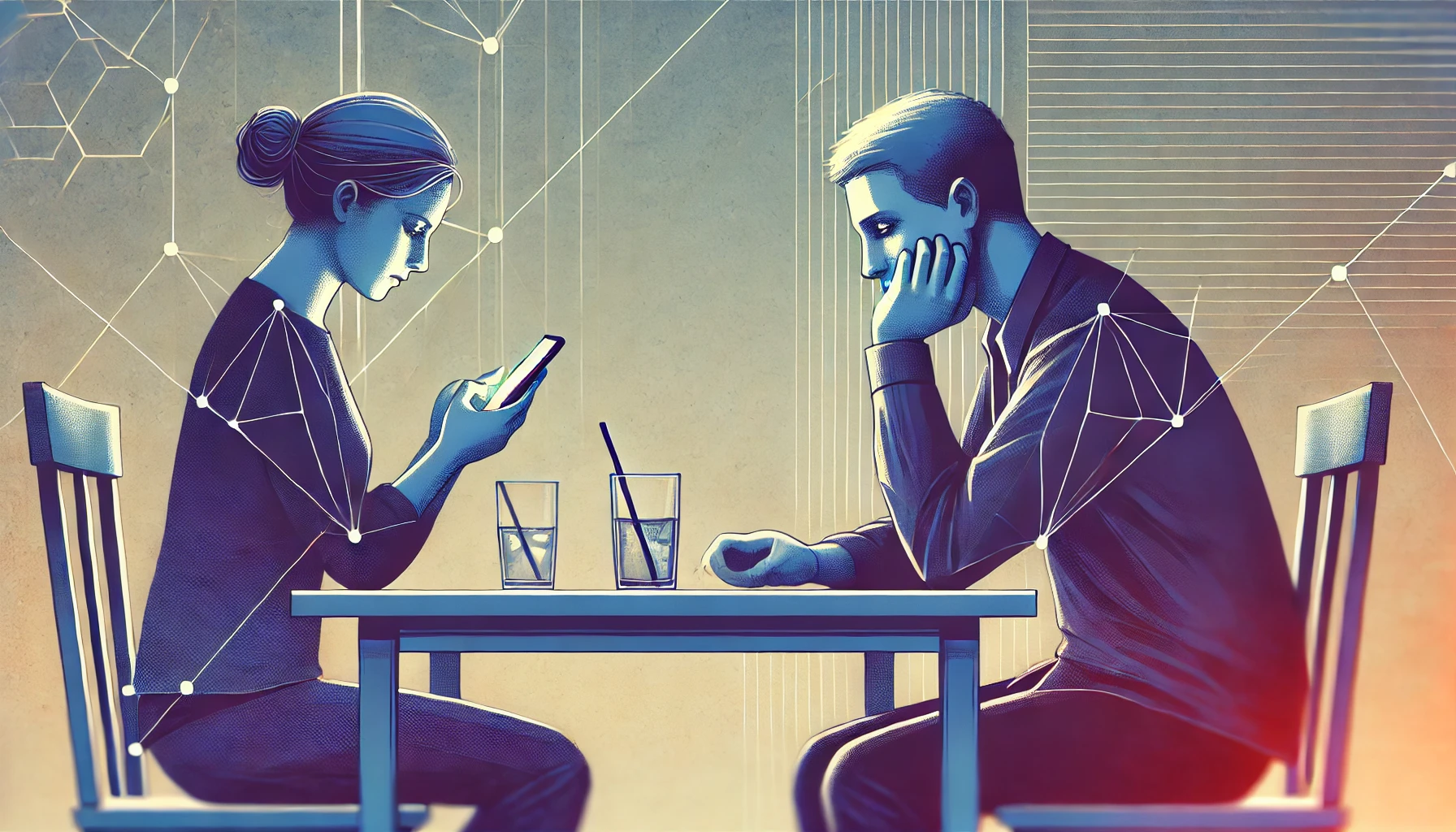Phubbing: The Social Cost of Ignoring Real Connections. In the age of smartphones and constant connectivity, a new term has entered the lexicon: “phubbing.” Short for “phone snubbing,” phubbing describes the act of ignoring someone in favor of your smartphone. While it may seem harmless, phubbing has significant consequences for relationships, mental health, and societal dynamics. This article delves into the psychology behind phubbing, its effects, and how to address it in a hyperconnected world.
What Is Phubbing?
Phubbing occurs when someone prioritizes their smartphone over in-person interactions. This behavior often happens unconsciously, whether it’s checking notifications during a conversation, scrolling through social media at the dinner table, or texting while spending time with loved ones. The phenomenon highlights the growing tension between digital connectivity and real-world relationships.
For insights into how smartphones impact attention spans, read How Social Media Is Rewiring Your Attention Span.
The Psychology of Phubbing
Phubbing is deeply rooted in psychological mechanisms, particularly those tied to smartphones and social media:
1. Fear of Missing Out (FOMO)
One of the main drivers of phubbing is FOMO, the fear of missing out on social updates, news, or other online interactions. This fear creates an irresistible urge to check one’s phone, even at the expense of real-life conversations.
2. Dopamine Loops
Notifications and social media interactions trigger dopamine release, reinforcing phone-checking behavior. Over time, this feedback loop makes it difficult to resist the urge to reach for a smartphone, even during important moments.
3. Attention Fragmentation
Smartphones fragment attention, making it harder to focus on in-person conversations. The act of phubbing signals to the other person that they are not a priority, which can erode trust and intimacy in relationships.
The Impact of Phubbing on Relationships
Phubbing can have profound effects on relationships, both personal and professional:
1. Reduced Relationship Satisfaction
Research shows that phubbing is associated with lower levels of relationship satisfaction. Partners who feel ignored in favor of a phone are more likely to feel unimportant and undervalued.
2. Increased Conflict
Phubbing can lead to misunderstandings and arguments. When one party feels neglected, resentment builds, creating a cycle of conflict that can be difficult to break.
3. Social Disconnection
Phubbing creates a barrier to genuine communication. Instead of engaging in meaningful conversations, individuals become preoccupied with their digital worlds, leading to a decline in social connection and empathy.
The Societal Implications of Phubbing
Beyond personal relationships, phubbing has broader societal implications:
- Workplace Dynamics: Phubbing during meetings or collaborative tasks undermines teamwork and productivity.
- Generational Divide: Older generations may perceive phubbing as disrespectful, further widening the gap between digital natives and those less reliant on technology.
- Public Spaces: Phubbing contributes to a decline in face-to-face interactions in public settings, eroding a sense of community.
For strategies to navigate the digital world more mindfully, explore Balanced Digital Diet: 8 Steps to Use Technology Mindfully.
How to Address Phubbing
Reducing phubbing requires a combination of self-awareness, communication, and boundary-setting. Here are actionable steps:
1. Practice Digital Mindfulness
Be present during in-person interactions by silencing notifications and keeping your phone out of sight. Mindfulness techniques can help you become more aware of your phone use and its impact on those around you.
2. Set Boundaries
Establish “phone-free” zones or times, such as during meals, family gatherings, or important conversations. This encourages deeper connections and reduces distractions.
3. Communicate Openly
If you feel neglected by someone’s phone use, express your feelings calmly and constructively. Open communication can help set mutual expectations and strengthen relationships.
4. Use Technology to Your Advantage
Apps and features that limit screen time or block notifications can be valuable tools for reducing phubbing. For example, enabling focus modes or using apps like Forest can create a more distraction-free environment.
Phubbing and Mental Health
The mental health implications of phubbing extend beyond the individuals being ignored:
1. Guilt and Shame
Chronic phubbers may experience feelings of guilt or shame when they realize how their behavior impacts others. This can contribute to a negative self-image and increased stress.
2. Anxiety and Loneliness
Both phubbers and those being phubbed may experience heightened feelings of anxiety and loneliness. For phubbers, the constant pull of their devices can create a sense of restlessness. For those being ignored, it can lead to feelings of isolation and unworthiness.
For more insights into the psychological effects of smartphone use, check out The Neuroscience of Smartphone Addiction.
The Future of Phubbing
As technology continues to evolve, phubbing may become less prevalent. Innovations like AI-driven notifications, which prioritize essential alerts and minimize distractions, could help reduce the temptation to check phones during social interactions.
- Social Awareness Campaigns: Public awareness campaigns can educate individuals about the impact of phubbing on relationships and encourage more mindful phone use.
- Technology Design: Developers are increasingly incorporating features that promote digital well-being, such as app usage trackers and notification controls.
Conclusion
Phubbing is more than a simple annoyance—it’s a behavior with far-reaching consequences for relationships, mental health, and society. By understanding the psychology behind phubbing and adopting mindful phone use practices, we can prioritize real-world connections over digital distractions. Remember, every small step toward being present can have a profound impact on your relationships and overall well-being.
To learn more about building healthier tech habits, read 5 Surprising Benefits of Practicing Digital Minimalism in Daily Life.





Leave a Reply